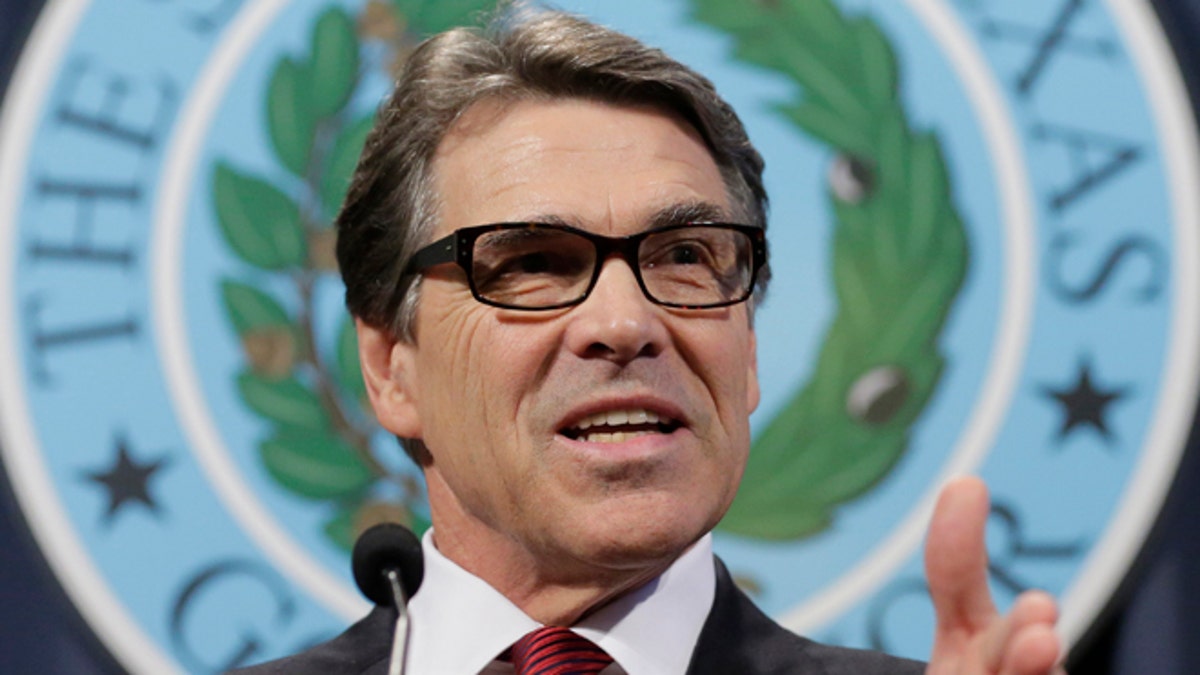
In this Friday, Oct. 17, 2014 photo, Texas Gov. Rick Perry answers questions during a news conference to discuss Texas Ebola prevention efforts in Austin, Texas. (AP)
Not satisfied with the federal response, several states are taking the Ebola crisis into their own hands – tapping emergency funds in their budgets, launching treatment units and holding public hearings to stanch the spread of misinformation about the virus.
The lines of responsibility for what the federal government and what the states should be doing have blurred in recent days, amid questions over guidance initially provided by the Centers for Disease Control and Prevention.
But the states touched by the outbreak scare, including Ohio where one Ebola patient visited before returning to Dallas, are scrambling to shore up their medical lines of defense.
On Monday, a legislative-spending panel in Ohio approved $800,000 for the state’s health department to better equip area hospitals if an outbreak occurs. Of that amount, about $300,000 would go toward strengthening Ohio’s stockpile of protective equipment which includes purchasing full-body suits, face masks and shoe covers. The rest will be spent on hiring a Cincinnati company to clean up contaminated sites and dispose of linens should the virus surface there.
The Ohio Department of Health’s current stockpile includes 102,122 face masks, 2,592 goggles, 1,600 shoe covers, 576 coveralls, 1,350 hoods, 105,300 gloves, 29,220 respirators, and 7,026 gowns. It’s enough to cover workers across the state through 16 “patient days” (which refers to the equipment needed to care for a patient over a 24-hour period), Lynne Bratka, interim chief of the Bureau of Health Preparedness at ODH, said.
Monday’s cash infusion buys Ohioans close to 100 days of coverage.
“Governor Kasich has directed us to be prepared to quickly and aggressively respond to local needs, and the legislature’s approval of our request will ensure we can do this,” Dr. Mary DiOrio, state epidemiologist and interim chief of the ODH Bureau of Prevention and Health Promotion, said in a written statement.
In Texas, Gov. Rick Perry also announced two new state-of-the-art Ebola treatment and infectious disease containment facilities.
The first U.S. Ebola patient, a Liberian national who died on Oct. 8, was treated at Texas Health Presbyterian Hospital.
Perry, who made the announcement in Dallas on Tuesday, stressed the need for better Ebola preparedness in his state.
"Presbyterian has played an important role," Perry said at the event. "With that said, that hospital has been on the front line. They have paid a heavy price."
Two nurses who cared for Ebola patient Thomas Eric Duncan later tested positive for the disease and remain hospitalized.
Texas Health Presbyterian admitted to making mistakes when it discharged Duncan who had initially come to the medical facility on Sept. 25. Duncan told hospital personnel he had recently traveled from Liberia, one of the hardest-hit countries in West Africa. Three days later, Duncan was once again taken to the hospital. He died 10 days later.
“The past three weeks have taught us that treating an infectious disease like Ebola is not just a theoretical problem,” Perry said.
Florida’s Gov. Rick Scott, too, is stepping up the response while demanding additional federal aid to help his state fight public health issues like Ebola. On Monday, the governor announced that the Florida National Guard is establishing two “rapid response teams” to help hospitals handle threats.
Despite calls for better preparedness, Scott, who is up for re-election, signed off on reducing 13 percent of staff positions at the Florida Department of Health last year.
Funding overall has been a matter of contention amid the current Ebola response, with federal health officials suggesting they would have been better prepared had funding not been cut.
Nationally, cuts have affected the CDC’s public health preparedness and response departments. Funding in 2013 was $1 billion less than it was in 2002. The reductions led to the elimination of thousands of jobs at state and local health departments.
Shifts in funding and other cuts have left some states to search their own budgets while waiting on additional support from the federal government.
New Jersey and Georgia are stepping up efforts by monitoring residents and visitors who have recently traveled to their states from West African nations.
Responding to emails and calls from nervous residents, Georgia Gov. Nathan Deal announced a 13-person task force to help calm complaints over the state’s preparedness. The task force, made up of experts from Emory University, the University of Georgia and members of the Georgia National Guard, will be led by Dr. Brenda Fitzgerald, Deal’s commissioner of public health.
Deal, who also is in the middle of a re-election campaign, got himself into some hot water last week when he said that “water kills the Ebola virus.”
In New York, Gov. Andrew Cuomo has assured the public that health workers are being properly trained, with officials saying all state hospitals are prepared and eight specific facilities are now designated for handling Ebola. Such designations are made independent of the CDC.
Lawmakers in Massachusetts are holding a public hearing Thursday to review the state’s response plans if Ebola surfaces there.
The Indiana State Health Department, working in tandem with local officials, has been given the green light from their governor to beef up medical measures so the state is prepared to treat patients and contain the spread of infectious diseases like Ebola.
Similar plans also are in place in California and Oregon.
“At my direction, state and local public health care systems began to prepare several weeks ago for any suspected cases of Ebola in Oregon,” Gov. John Kitzhaber said in a written statement. “Today, those partners are working together to have a coordinated and appropriate response.”




